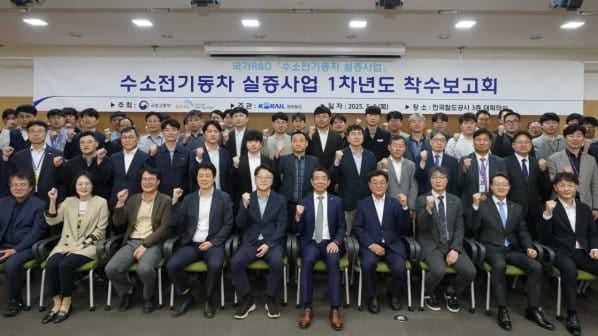
Reservation booth:+86(0)21-3114 8748
Visit/media contact:+8613601815988
QQ:2463282767
email:artsexpo@sgexpo.cn
South Korea's Ministry of Land, Infrastructure, Transport and Tourism (Molit) recently launched a research and development program aimed at accelerating the marketization of hydrogen-powered passenger trains so that they can run on short and medium-distance lines on the national rail network.
With a total investment of 32.1 billion won (US$22.5 million) by 2027, the project will be led by the state-run railway operator Korail to carry out train and infrastructure research and development and field tests. The initiative builds on the core hydrogen technology R&D completed in 2022, with the current project focusing on commuter trains with distributed power.

According to the Ministry of Land, Infrastructure, Transport and Tourism, hydrogen trains are expected to be twice as energy efficient as diesel trains and can decarbonize passenger lines that do not require catenary, which accounts for about 18% of the cost of traditional two-track electrified lines.
According to the plan, a two-car train powered by hydrogen fuel cells will be produced by 2027. The train will have a maximum power of 1.2 megawatts, a maximum operating speed of 150 km/h, and a range of more than 600 kilometers in a single hydrogen refueling. After obtaining the safety certification, the train will be tested on a dedicated test line.
Supporting facilities, including hydrogen refueling stations and vehicle maintenance bases, will also be deployed on existing non-electrified lines to operate in conjunction with new hydrogen trains to test overall performance.
The Ministry of Land, Infrastructure, Transport and Tourism predicts that the global hydrogen rail vehicle market is expected to grow at an annual rate of more than 25%, reaching a market size of $26.4 billion by 2035. The South Korean government hopes to seize the global market opportunity by establishing a technical and regulatory framework for hydrogen trains and taking the lead in completing demonstration operations.
Zheng Yijing, head of railway safety policy at the Ministry of Land, Infrastructure, Transport and Tourism, said: "As old diesel trains are rapidly replaced by hydrogen trains, upstream and downstream industries such as core components and infrastructure will be fully driven, which will contribute to the expansion and upgrading of the hydrogen transportation industry ecology." ”
According to the Busan Metropolitan Government, Busan plans to build a 24.21-kilometer-long light rail line serving the port area, and will use hydrogen fuel cell light rail trains (LRV) as operating vehicles. The total investment of the project is expected to reach 724 billion won.
The line, called the Busan Port Line, was formed by the merger and reorganization of three projects that had been slowing down: the Yeongdo Line, the Youam-Ganam Line, and the C-Bay Line (formerly part of the Bukgang Redevelopment Project). According to the city of Busan, the feasibility of the project has been significantly improved after the merger, and the comprehensive benefit-to-cost ratio (BCR) has reached 0.89. If approved, 60% of the construction cost will be borne by the central government and 40% will be borne by the city of Busan.
The Busan Port Line will run through the main area of Busan's Inner Harbour, starting from Taejongdae Park on Yeongdo Island on the west side, and the line will pass through the central area of the port to the east and connect to the hinterland on the east side. It is planned to interchange with Busan Subway Line 1 (Jungang Station, Beomil Station) and Line 2 (Mungang Station).
The eastern section of the line will be transferred to the land area and extended to Suyeong Bay and Kyungsung University/Pukyung University area, further strengthening the interconnection of core nodes such as Busan Railway Station and International Passenger Terminal.
Busan is the latest city in South Korea to announce the construction of a light rail system, and Seoul, Daejeon, and Ulsan are also actively promoting hydrogen light rail projects. Among them, Ulsan City has signed a memorandum of understanding with the Korea Railway Technology Research Institute (KRRI) in 2024 to cooperate in the development of the world's first hydrogen light rail line.
Busan Mayor Park Hyung-jun said, "We will do our best to create an urban rail transit system that can be easily used by citizens no matter where they are. ”
Rail Transit Exhibition Booth Reservation
Rail Transit Exhibition Free registration for visit